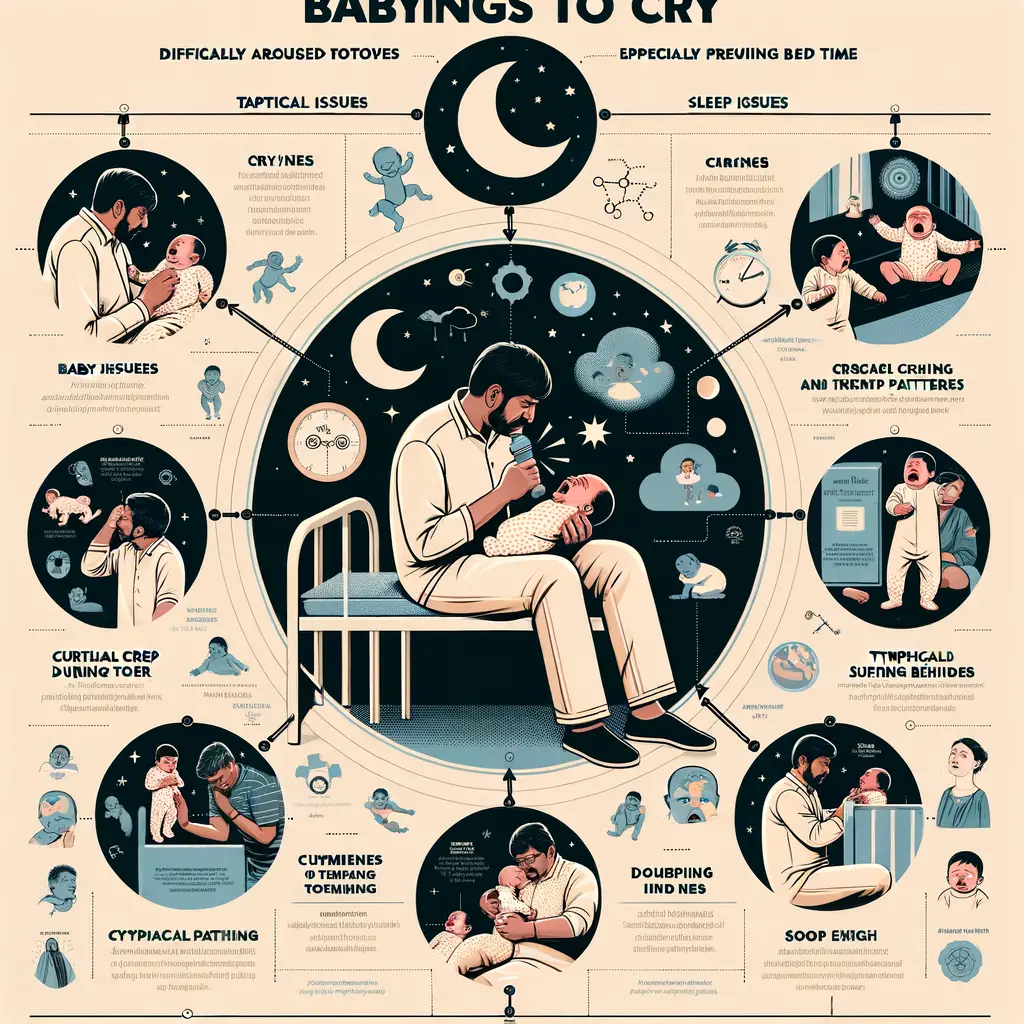Introduction: Understanding Baby Cries
Every parent, caregiver, or anyone who has spent time around babies knows that a baby’s cry is their primary means of communication. It can be challenging to understand what a baby is trying to communicate through their cries, especially for first-time parents. However, with a little knowledge and practice, you can learn to decode the language of baby cries.
Decoding the language of baby cries
Contrary to what many people believe, baby cries are not just random noises. They are a form of communication. According to a study by Dr. Priscilla Dunstan, babies have five distinct types of cries that correspond to specific needs. These include cries for hunger, sleepiness, discomfort, burping, and general distress. By listening carefully and observing your baby’s behavior, you can learn to distinguish between these different cries and respond appropriately.
Common reasons for babies crying
Babies cry for a variety of reasons. The most common ones include hunger, tiredness, discomfort from a dirty diaper, the need for comfort, or even overstimulation from too much noise or activity. Sometimes, babies also cry due to medical reasons like colic or acid reflux. It’s important to remember that every baby is unique and what works for one may not work for another. Therefore, understanding your baby’s individual needs and patterns is key to effectively responding to their cries.
In the following sections, we will delve deeper into understanding baby sleep problems, why babies cry at night, and how to deal with a crying baby. By the end of this article, you will be equipped with the knowledge and tools to better understand and respond to your baby’s cries.
Understanding Baby Sleep Problems
One of the most common challenges that new parents face is understanding their baby’s sleep patterns. It’s crucial to understand that babies have different sleep cycles than adults. This knowledge can help you identify and address any sleep problems your baby may be experiencing.
Overview of Baby Sleep Cycle
Let’s take a closer look at the baby sleep cycle and how it evolves over time.
Stages of Baby Sleep Cycle
Babies, like adults, go through several stages of sleep. However, the duration and frequency of these stages are different. A newborn’s sleep cycle is divided into two main stages: REM (Rapid Eye Movement) sleep and non-REM sleep. During REM sleep, babies dream and their brains are active. Non-REM sleep, on the other hand, is a deeper, more restful sleep.
It’s important to note that babies spend more time in REM sleep than adults. This is because REM sleep plays a crucial role in the development of their brains.
How Baby Sleep Patterns Evolve
As babies grow, their sleep patterns begin to change. Newborns sleep in short bursts throughout the day and night, typically every 2-3 hours. However, by the time they are 3-6 months old, many babies start to develop a more regular sleep pattern. They begin to sleep more at night and less during the day.
By the time they reach their first birthday, most babies sleep for about 14 hours a day, with the majority of that sleep occurring at night. However, every baby is unique and some may need more or less sleep than others.
Common Baby Sleep Issues
Understanding and addressing common baby sleep issues is crucial for their health and development. Let’s delve into how to identify these problems and the impact they can have on a baby’s behavior.
Identifying Baby Sleep Problems
Identifying sleep problems in babies can be a challenging task, especially for new parents. Babies may experience a range of sleep issues, including difficulty falling asleep, frequent night awakenings, and short naps. These issues can often be identified by changes in their normal sleep patterns.
For instance, if your baby is having trouble falling asleep or wakes up frequently during the night, it could be a sign of a sleep problem. Similarly, if your baby’s naps are consistently shorter than 1 hour, it might indicate a sleep issue. It’s important to remember that every baby is different, and what’s normal for one baby might not be for another. Therefore, understanding your baby’s unique sleep patterns is key to identifying potential sleep problems.
Impact of Sleep Issues on Baby’s Behavior
Sleep issues can significantly impact a baby’s behavior. A well-rested baby is generally happier, more active, and more willing to engage with their surroundings. On the other hand, a baby who isn’t getting enough sleep might be irritable, less active, and show signs of developmental delays.
For example, a study found that babies who don’t get enough sleep are more likely to have problems with attention, emotional control, and problem-solving skills as they grow older. Additionally, sleep-deprived babies may also be more prone to mood swings and tantrums. Therefore, ensuring your baby gets enough sleep is not just important for their physical health, but also for their emotional and cognitive development.
In conclusion, understanding and addressing baby sleep issues is crucial for their overall well-being. If you notice any changes in your baby’s sleep patterns or behavior, it’s always a good idea to consult with a healthcare professional.
Why Babies Cry at Night

Have you ever wondered why your little one seems to cry more at night? It’s a common question that many parents ask. Let’s delve into the reasons behind this behavior and how it’s linked to their sleep patterns.
Link Between Sleep and Crying
It’s important to understand that babies have different sleep patterns compared to adults. Their sleep cycles are shorter and they often wake up during the night. This is completely normal, but it can sometimes lead to crying.
Understanding the sleepy baby behavior
Babies often exhibit certain behaviors when they’re sleepy. They might rub their eyes, yawn, or become fussy. These are all signs that your baby is ready for a nap or bedtime. However, if they’re overtired, they might cry as a way to express their exhaustion. It’s crucial to learn these signs and respond promptly to prevent your baby from becoming overtired.
Why babies cry before sleep
There are several reasons why babies cry before sleep. They might be uncomfortable, hungry, or simply need a diaper change. Sometimes, they just need a little help to settle down. It’s also worth noting that babies go through different sleep stages, and they might cry as they transition between these stages. This is often referred to as “sleep crying” and is usually a normal part of their sleep cycle.
Understanding why your baby cries at night and the link between their sleep and crying can help you better respond to their needs. Remember, every baby is unique and what works for one might not work for another. It’s all about learning and adapting to your baby’s individual needs.
Case Study: Night-Time Crying
Let’s delve into a case study that focuses on night-time crying. This study will provide us with a deeper understanding of why babies cry at night and how we can effectively respond to their needs.
Observations and Findings
In this study, researchers observed a group of babies aged between 3 to 6 months over a period of six weeks. They found that a significant number of babies cried more frequently during the night. The peak crying time was observed to be between 9 PM to midnight. The researchers also noted that the crying often coincided with the baby’s sleep cycle, suggesting a link between sleep and crying.
Furthermore, it was observed that babies who had a consistent bedtime routine cried less during the night. This finding suggests that a structured sleep routine can help reduce night-time crying.
Key Takeaways
The key takeaway from this study is that night-time crying in babies is often linked to their sleep cycle. It’s a signal that they are tired and need to sleep. However, if the baby is unable to fall asleep, they may cry out of frustration.
Another important insight is the positive impact of a consistent bedtime routine. Establishing a routine can help signal to the baby that it’s time to sleep, reducing the likelihood of night-time crying.
To conclude, understanding the reasons behind night-time crying and implementing a consistent bedtime routine can greatly help in reducing the frequency of crying. Remember, every baby is unique and what works for one might not work for another. It’s all about understanding your baby’s needs and responding accordingly.
Dealing with a Crying Baby
When your baby cries, it’s a signal that they need your attention. It’s their way of communicating with you. But, understanding what they want can be a challenge, especially for new parents. Here are some practical tips to help you soothe your crying baby and create a conducive sleep environment.
Practical Tips for Parents
Every baby is unique and what works for one might not work for another. However, there are some common strategies that can help soothe a crying baby and promote better sleep.
How to soothe a crying baby
Firstly, try to understand the reason behind the crying. It could be hunger, a dirty diaper, or they might just need a cuddle. Try feeding your baby, changing their diaper, or simply holding them close to you. If these don’t work, your baby might be overstimulated. In this case, a quiet, dimly lit room can help calm them down. A gentle rocking motion can also soothe a crying baby. Remember, it’s important to stay calm and patient. Your baby can sense your stress and it might make them more upset.
Creating a conducive sleep environment
A good sleep environment is crucial for your baby’s sleep. Make sure the room is dark and quiet. A nightlight or a white noise machine can be helpful. The temperature of the room should be comfortable – not too hot and not too cold. A good rule of thumb is to dress your baby as you would dress yourself for the room temperature. A consistent bedtime routine can also help signal to your baby that it’s time to sleep. This could include a bath, a bedtime story, or a lullaby.
Remember, it’s perfectly normal for babies to cry and have trouble sleeping. But with patience and these practical tips, you can help your baby feel more comfortable and get a good night’s sleep.
When to Seek Professional Help
While it’s normal for babies to cry and have some sleep issues, there are times when you may need to seek professional help. Let’s explore some of the signs that indicate serious sleep issues and when you should consult a pediatrician or sleep specialist.
Signs that indicate serious sleep issues
It’s important to pay attention to your baby’s sleep patterns and behavior. If your baby is consistently having trouble falling asleep, staying asleep, or is excessively sleepy during the day, these could be signs of a serious sleep issue. Other signs include:
- Snoring loudly or gasping for air while sleeping
- Experiencing nightmares or night terrors
- Exhibiting unusual movements during sleep
- Having difficulty breathing during sleep
If your baby is showing any of these signs, it’s important to seek professional help. A sleep specialist or pediatrician can provide guidance and treatment options.
Consulting a pediatrician or sleep specialist
If you’re concerned about your baby’s sleep habits, it’s always a good idea to consult with a professional. A pediatrician can assess your baby’s overall health and determine if there are any underlying medical conditions that could be affecting their sleep. They can also refer you to a sleep specialist if needed.
A sleep specialist can provide a more in-depth evaluation of your baby’s sleep issues. They can conduct sleep studies, provide treatment options, and offer strategies to improve your baby’s sleep habits. Remember, it’s always better to seek help sooner rather than later when it comes to your baby’s health and well-being.
In conclusion, while it’s normal for babies to have some sleep issues, it’s important to know when to seek professional help. By being aware of the signs of serious sleep issues and knowing when to consult a pediatrician or sleep specialist, you can ensure your baby gets the help they need to sleep soundly.
Conclusion: Navigating the World of Baby Sleep

As we draw this informative journey to a close, it’s essential to take a moment to recap what we’ve learned and provide some final thoughts on dealing with baby sleep issues. The world of baby sleep can be complex, but with the right knowledge and understanding, it becomes easier to navigate.
Recap of understanding baby cries and sleep patterns
Throughout this article, we’ve explored the intricacies of baby cries and sleep patterns. We’ve learned that babies cry for various reasons, including hunger, discomfort, or the need for sleep. Understanding these cries is crucial for parents to respond effectively and ensure their baby’s needs are met.
We’ve also delved into the complexities of baby sleep patterns. Babies, especially newborns, have different sleep cycles compared to adults. They spend more time in REM sleep, which is essential for their brain development. However, this also means they wake up more often, leading to sleep issues.
Final thoughts on dealing with baby sleep issues
Dealing with baby sleep issues can be challenging, but it’s not impossible. Patience, understanding, and consistency are key. It’s important to establish a regular sleep routine for your baby and stick to it. This helps your baby understand when it’s time to sleep and can significantly improve their sleep quality.
Remember, every baby is unique, and what works for one might not work for another. Don’t be disheartened if a strategy doesn’t work immediately. Keep trying different approaches until you find what works best for your baby.
In conclusion, navigating the world of baby sleep can be a challenging journey, but it’s one filled with rewarding moments. With the right knowledge and understanding, you can help your baby develop healthy sleep habits that will benefit them for a lifetime.















